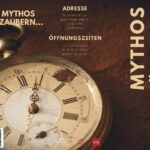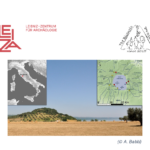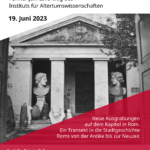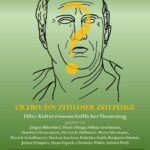Events

Das LEIZA und der Arbeitsbereich für Klassische Archäologie der Johannes Gutenberg-Universität Mainz laden herzlich ein zu den "Mainzer Vorträgen zur Römischen Archäologie" (MaVRA). Zum Auftakt der gemeinsamen Reihe am Mittwoch, 24. April 2024, 18 ct, begrüßen wir Dr. Clarissa Blume-Jung (Ruhr-Universität Bochum) mit einem Vortrag zum Thema "Die Gräber Roms. Zur Vielfalt des Bestattungswesens der Metropole im 1. und 2. Jh. n. Chr." An insgesamt sechs Terminen im Sommersemester präsentiert die Vortragsreihe Forschungen zu verschiedenen Aspekten der römischen Welt und ihrer materiellen Kultur. Veranstaltungsort ist der Vortragssaal des LEIZA. Zum aktuellen Programm Leibniz-Zentrum für Archäologie Ludwig-Lindenschmit-Forum 1 55116 Mainz ...

Vom 23. November 2023 bis zum 6. Februar 2024 in der Schule des Sehens, JGU Lassen Sie sich mitnehmen auf eine Reise durch die Zeit! Tauchen Sie ein in die Atmosphäre früher archäologischer Forschung, und lernen Sie die ersten Stars der Archäologie kennen. Erleben Sie die faszinierende Welt der Fiktion und Abenteuer, und seien Sie dabei, wenn der Mythos Archäologie entzaubert wird. ÖFFNUNGSZEITEN Montag und Mittwoch 12–18 Uhr Dienstag und Donnerstag 14–18 Uhr Bitte beachten Sie, dass die Ausstellung während der Weihnachtsferien (22.12.2023 bis 07.01.2024) nicht geöffnet ist! Die Ausstellung kann kosten- und barrierefrei besucht werden. Zur Ausstellung finden zusätzlich Abendvorträge statt, zu denen Sie ebenfalls sehr herzlich eingeladen sind: 22.11.2023, 18:15 Uhr, Raum P4, Philosophicum Vernissage. Grußworte. Lesung und Diskussionsrunde mit Daniela Heller, Autorin von „Pfostenloch“ 12.12.2023, 18:15 Uhr, Raum P4, Philosophicum Vortrag „Knochen – Scherben – Sensationen“: Die Außendarstellung von Archäologien zwischen den Anfängen und der Gegenwart“. Prof. Dr. Alexander Pruss, Vorderasiatische ...
Das LEIZA und der Arbeitsbereich für Klassische Archäologie der Johannes Gutenberg-Universität Mainz laden im Wintersemester 2023/24 zur neuen Reihe "Mainzer Vorträge zur Römischen Archäologie" (MaVRA) ein. Ab dem 8. November werden jeden zweiten Mittwoch aktuelle Forschungen zu allen Aspekten der römischen Welt und ihrer materiellen Kultur im Vortragssaal des LEIZA präsentiert. Zum Programm ...
Die Klassische Archäologie lädt ein zum diesjährigen WINCKELMANN-VORTRAG Als Gastredner begrüßen wir Prof. Dr. Stephan G. Schmid (Berlin) mit einem Vortrag zum Thema Δέσποιν', ἃ Γολγώς τε καὶ Ἰδάλιον ἐφίλησας …Das Heiligtum der großen Göttin von Idalion (Zypern) Am Montag, 04.12.2023 um 18 Uhr c.t. in der Alten Mensa / Atrium Maximum, Johann-Joachim-Becher-Weg 3, Campus Johannes Gutenberg-Universität Mainz mit anschließendem Empfang Kontakt: klassarch@uni-mainz.de ...
International Conference, November 13–14, 2023, Johannes Gutenberg-Universität Mainz Texts and images encapsulate ideas, crystallized within a specific moment, and imbued with particular intentions. When etched into stone, molded in clay, or inscribed upon parchment, they transcend the confines of time and space. Upon exposure to a second glance, they invite reinterpretation and reutilization. In this process, their original meaning may be retained or deliberately hinted at. Conversely, they may lose their initial significance, finding themselves within entirely different contexts, thereby adopting unforeseen and novel connotations. In the simultaneous consideration of an artifact's primary and secondary use, some might perceive ambiguities of forms, topoi, etc., or perhaps discern an undercurrent of irony. In more disruptive object histories or textual traditions, we might be prone to consider them as 'flotsam', adrift from distant epochs and shores. To what extent are such assumptions and their implications for reception history justified? To what extent ...
18 -20 October 2023, Weingut Wasem, Ingelheim am Rhein This year marks the beginning of the long-term project disiecta membra - Stone Architecture and Urbanism in Roman Germany, which is funded by the Academy of Sciences and Literature | Mainz. On this occasion, a start-up conference is organized by the scientific directors Johannes Lipps (JGU Mainz), Kerstin P. Hofmann (RGK Frankfurt a. M.), and Aline Deicke (University Marburg)". The program is divided into three sections: 1. history and practices of science, 2. architecture: state of research, perspectives and desiderata, 3. digital archaeology and digital editing. Info und Pogramm ...

Feldkampagne 2023 (18. August bis 30. September 2023) Was - Die archäologische Fundstätte „Bisenzio“ befindet sich am gleichnamigen „Monte Bisenzio“ (404,8 m), der sich am Südwest-Ufer des Bolsena-Sees (ca. 305 m ü.d.M.) erhebt, 4 km nördlich der modernen Stadt Capodimonte in der Provinz Viterbo (Latium, Italien). Falls sich der Name „Bisenzio“ von „Visentium“ ableitet, dem Namen des römischen Munizipiums, dessen Lage noch unklar ist, so ist der Beginn einer dauerhaften Siedlung auf dem Hügel viel früher und geht mindestens auf die späte Bronzezeit zurück. Wie die zahl- und aufschlussreichen Haus- und Bestattungsbefunde – die unsystematisch untersucht und nur sehr selten veröffentlicht wurden – zeigen, florierte zwischen dem späten 10. und dem frühen 5. Jh. v. Chr. nicht nur auf dem Hügel eine sehr dynamische Gemeinschaft, sondern auch im Bereich der angrenzenden Felder und an der mittlerweile versunkenen Seeküste. Die Nekropolen liegen in etwa 4 km Entfernung südöstlich, westlich und nordwestlich ...

Am Montag, den 19. Juni 2023, findet der fünfte IAW-Jahresvortrag statt; Bitte beachten Sie die Raumänderung: Der Vortrag von Prof. Ortwin Dally (DAI Rom) findet in P3 (00-151), um 18 c.t. statt. Im Anschluss gibt es einen Umtrunk in der Schule des Sehens. ...

Am Samstag, dem 21. Januar 2023, findet der elfteThementag der Mainzer Klassischen Philologie statt. Er wird organisiert vom lateinischen Hauptseminar (WS 22/23) und von Univ.-Prof. Dr. Christine Walde, Dr. Patrick Schollmeyer und Matthias Heinemann (M.Ed.) und widmet sich Cicero aus vielen verschiedenen Perspektiven. Der Thementag richtet sich nicht nur an Studierende und SchülerInnen, sondern steht allen an der römischen Antike Interessierten offen, die an diesem Tag einen Einblick in die Arbeitsweise der Altertumswissenschaften gewinnen und sich in einen mittels kulturwissenschaftlicher Fragestellungen erschlossenen Raum jenseits weißer Togen und marmorner Ästhetik vorwagen wollen. Los geht es ab 9:15 Uhr wieder in Präsenz (Philosophicum, P10) und als Stream digital im Web (Zugangsmodalitäten werden kurz vor Beginn bekanntgegeben). Das Programm finden Sie hier. Um die Zugangsdaten zu erhalten, melden Sie sich bitte bei Univ.-Prof. Dr. Christine Walde an. ...
Ringvorlesung WiSe 2022/23 Im Laufe seiner rund 2000-jährigen Stadtgeschichte wurde Mainz zu eine große Zahl unterschiedlicher Religionen mit individuellen Praktiken geprägt: Die römischen Truppen brachten im vorletzten Jahrhundert v.Chr. ihre Gottheiten mit, ab dem 3. Jahrhundert hielt das Christentum Einzug. Unter Bozifazius wandelte sich Mainz im 8. Jahrhundert zu einem der christlichen Zentren des römisch-deutschen Reichs. Parallel entstand eine der ältesten jüdischen Gemeinden in Deutschland, die als Teil der SchUM-Stätten UNESCO-Weltkulturerbe ist. Spätestens mit muslimischen Soldaten der französischen Besatzungsarmee nach dem Ersten Weltkrieg erreichte der Islam die Stadt, der bis heute den Alltag in Teilen der Altstadt und der Neustadt prägt. Diese Entwicklungen und ihre Herausforderungen für die Mainzer Bevölkerung ist die Ringvorlesung „Beten in Mainz“ gewidmet. Wissenschaftler:innen aus verschiedenen Disziplinen der JGU Mainz, Fachleute von Mainzer Institutionen sowie ausgewählte externe Expert:innen werfen Schlaglichter auf die religiösen Praktiken der vergangenen 2000 Jahre. Dabei sollen – wann immer möglich – Einzelschicksale ...
